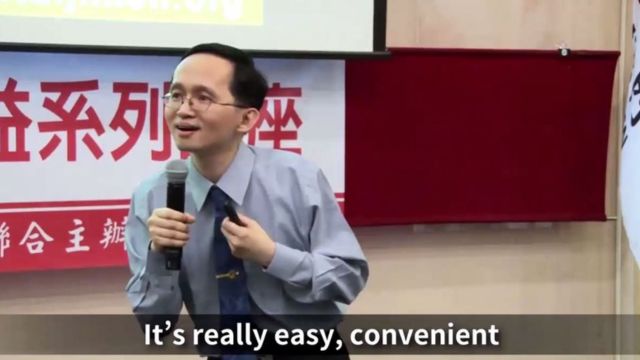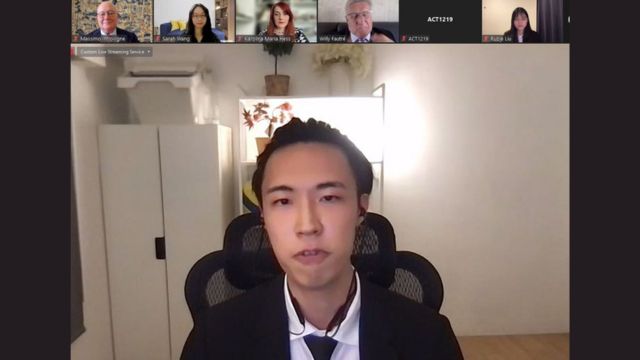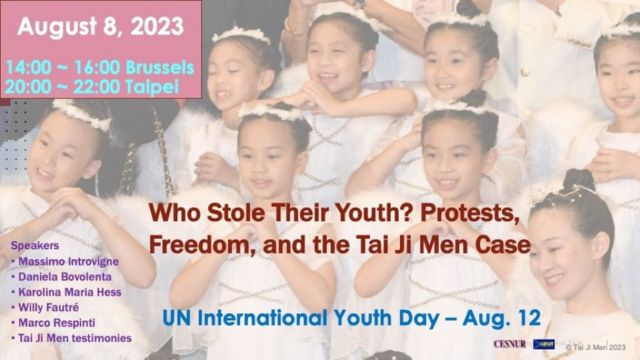Their youth was stolen by persecution and injustice but they found it again by witnessing for peace, love, conscience, and justice.
by Alessandro Amicarelli

On August 8, 2023, CESNUR and Human Rights Without Frontiers organized one of their by-monthly webinars about the Tai Ji Men case, with the title “Who Stole Their Youth? Protests, Freedom, and Tai Ji Men Case,” in preparation of the United Nations International Youth Day, August 12.
Massimo Introvigne, an Italian sociologist who serves as managing director of CESNUR and editor-in-chief of “Bitter Winter,” opened the webinar by comparing two movies, “Youth” by Paolo Sorrentino, where two old artists struggle with the problem of accepting that their youth is gone forever, and “Pirates of Caribbean: On Stranger Tides,” an adventure film about the quest for the mythical Fountain of Youth. The bad news, Introvigne said, is that there is no Fountain of Youth. The good news is that we can all find our own Fontain of Youth, which is inside all of us and keeps us spiritually young: conscience. This is the main teaching of Dr. Hong Tao-Tze, the Shifu (Grand Master) of Tai Ji Men. His dizi (disciples) proved they had learned it, Introvigne said, by “losing” their youth by spending a good part of it protesting injustice, but at the same time “finding” the eternal spiritual youth the legend of the Fountain alludes to by focusing on conscience as their moral compass.
Introvigne then presented a video about the recent participation of Dr. Hong and Tai Ji Men at the World Conference of Mayors in New Orleans, Louisiana. On August 4, Dr. Hong was presented there with the first “Love and Peace Award” in forty years by Johnny Ford, the founder of the World Conference of Mayors and its president since the organization was established in 1984. Introvigne also introduced the speakers of the first session, Daniela Bovolenta and Karolina Maria Kotkowska.

Bovolenta, an Italian author who is often published in “Bitter Winter,” discussed a recent incident in Italy, where an article in the daily newspaper “La Repubblica” created considerable controversy. Veteran journalist Alain Elkann, who happens to be the father of the owner of “La Repubblica,” complained that he was disturbed in his business-class train journey to Southern Italy, while he was sitting in his linen suit and reading a book by Marcel Proust in French, by young boys who seemed to talk only about girls and soccer. Some found the article arrogant and elitist—with good reasons, Bovolenta said—while others believed Elkann had been brave enough to tell the unpopular truth that many young people today are rude and uneducated. Bovolenta concluded that the question is deeper than it seems. Culture and good manners cannot be taken for granted, even among young people travelling in business class and thus presumably coming from well-off families. Good manners come from an education based on conscience and spirituality. This is the kind of education Dr. Hong offers, Bovolenta said. It is this education that made so many dizi spend their youth bravely witnessing for peace, love, and justice.
The full video of the webinar.
Kotkowska, a lecturer at Jagiellonian University in Krakow, Poland, described youth as a wellspring and even a volcano of energy. The whole problem of education is how to give this energy a direction without repressing it. Kotkowska illustrated this point with references to popular Swedish author of children literature Åsa Lind and Italian pedagogist and Theosophist Maria Montessori. She also mentioned the concept of “Great Untruths” developed by American authors Greg Lukianoff and Jonathan Haidt: false notions diffused in our societies and socially harmful. Kotkowska illustrated how Tai Ji Men dizi, following the teachings of Dr Hong, avoided all the Great Untruths and developed balanced and harmonious characters. This gave them the moral force to resist the persecution by obtuse bureaucrats who seem to be very much controlled by the Great Untruths.

Willy Fautré, co-founder and director of Human Rights Without Frontiers, told the story of the United Nations International Youth Day, included among the UN days of observance in 1999. He also mentioned the theme the UN has chosen for the 2023 International Youth Day, “Green Skills for Youth: Towards a Sustainable World.” The theme tries to favor the emergence among youth of an ecological conscience. What prevents this, Fautré said, are those the Christians call the “seven deadly sins,” whose common feature is selfishness. Non-Christian cultures and spirituality also have similar concepts, Fautré concluded, complimenting Dr. Hong for teaching young and old dizi how to overcome selfishness and live according to conscience.
Fautré then presented a video on how qigong as taught by Tai Ji Men may solve many of the worst current problems. They come from the heart, in two senses of the word. On the one hand, cardiovascular diseases and depression are the main causes of death throughout the world. On the other hand, practicing qigong is not a purely physical exercise but should be accompanied by a change of heart and a turn to conscience.

Fautré introduced the testimonies of five dizi. Sarah Wang, a business department specialist in a shipping industry, reported how she improved her character by practicing Qigong with Tai Ji Men since the age of 5. Later, she participated with Dr. Hong in several international events. She was particularly moved when in 1999, at Seattle’s Seafair Torchlight Parade, hundreds of thousands of citizens and tourists cheered her group by shouting “I love Taiwan! I love Tai Ji Men!” She was also impressed when at the 2012 UN Conference on Sustainable Development Rio+20 in Rio de Janeiro, Brazil, she saw several heads of state and other leaders expressing deep respect for Dr. Hong and his teachings. She contrasted these experiences with the injustice suffered by Tai Ji Men in Taiwan, and expressed the hope that justice may one day be restored.

Bobby Chen, a storyboard artist based in Canada, discussed the meaning of International Youth Day in a world where half of the Earth’s human being are 30 or younger. Chen said that one main problem of the youth is to learn how to discern between true and fake news. He mentioned the example of Lu Longqi, a Qing official, who attributed the problems of the dynasty to three causes: old unsolved cases, old, corrupted officials still in charge, and corruption in general. These problems, Chen said, are still around, at least in Taiwan, and are indeed key features of the Tai Ji Men case.

Lilian Lin, a graphic designer, reported how she attended as a volunteer representing FOWPAL, the Federation of World Peace of Love founded by Dr. Hong, the 17th United Nations International Youth Assembly held at the ECOSOC Chamber in the United Nations Headquarters in New York. Listening to Nobel Prize laureates, legal experts, diplomats, and activists, reminded her of a basic teaching of Dr. Hong: fight for justice and human rights without surrendering to anger and resentment. This is what dizi did, even when confronted with enormous injustice, Lin concluded.

Howard Kuan, a university student, addressed the problem of tax injustice in Taiwan. While young dizi and others advocate for tax and legal reform in the streets, they understand that many Taiwanese are not fully aware of how serious the problem is. In 2022, there were more than 13 million cases of new taxes and arrears enforcement in Taiwan, with a 7.53-fold rise in twenty years. These figures, together with some spectacular cases of tax injustice, generate a situation of fear and insecurity among the affected citizens, something which is also demonstrated by the Tai Ji Men case, Kuan said.

Rubie Liu, a freelancer, discussed the problems of young people looking for a job in Taiwan, where the technological sector dominates the job market, and it seems that those seeking employment in a different field have little chances to find it. She traced the problem to shortcomings in Taiwan’s education system and contrasted them with Dr. Hong’s teachings on conscience-based education and the spirit of the Montessori Schools she encountered in India in 2022 when she attended together with her Shifu the 22nd International Conference of Chief Justices of the World. Mentioning the recent visits of international scholars to Taiwan to discuss human rights and religious liberty issues, Liu said that the Tai Ji Men case is a mirror of Taiwan’s problems, and its solution would solve at the same time many of them.

Marco Respinti, an Italian journalist and scholar who serves as director-in-charge of “Bitter Winter,” offered the conclusions of the webinar. He noted that the same concepts are often repeated in webinars about the Tai Ji Men case. This is not because scholars and activists who speak are at loss of original arguments, but because the Tai Ji Men case remains unsolved, and the same injustices continue to be perpetrated. Respinti quoted the ancient Latin poet Ovid who contrasted the brilliancy of youth with the “hateful old age.” Ovid, Respinti commented, was not being disrespectful to the elderly. His reference was to a spiritual oldness, when we forget our memory and our hopes. The recent celebration of Dr. Hong’s 80th birthday, Respinti said, proved that Tai Ji Men dizi, and their Shifu himself, remain young at heart because, despite persecution, they do not forget their conscience and their hopes.
The event concluded with the second part of a video featuring a concert by young Tai Ji Men dizi, held in the anniversary of the 2007 Supreme Court decision that declared Tai Ji Men innocent of all charges, including tax evasion. The concert was held in the Swiss Mountain Villa, a property bought in 1995 by Dr. Hong and destined to be a large event venue and a self-cultivation center for Tai Ji Men. From 1997 to 2020, the property was first frozen and then used as a collateral in the fabricated tax case against Tai Ji Men. Only in 2020 was the Swiss Mountain Villa finally returned to Dr. Hong. By then, because of the problems that lasted for more than 23 years, the property was in a sad state of abandonment. But music testifies that hope never dies.
Source: Bitter Winter

